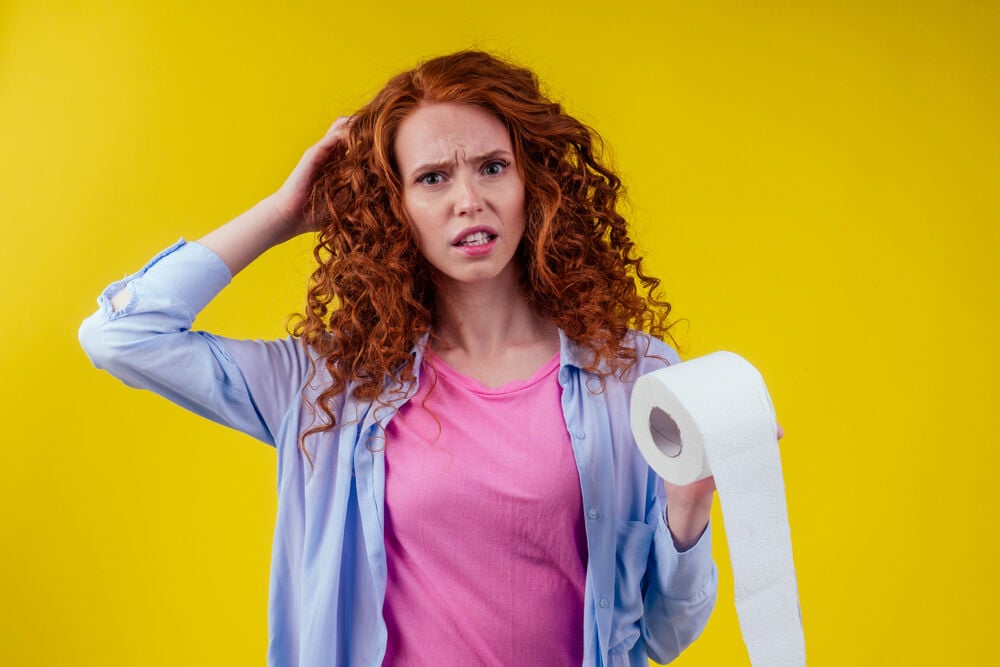Why does my poop burn? It’s a question many people have, but most don’t ask it aloud. The truth is that burning poop happens to most people at some point. Often it goes away on its own; other times, it may be due to a more serious condition.
-
Tracking cycle
-
Getting pregnant
-
Pregnancy
-
Help Center
-
Flo for Partners
-
Anonymous Mode
-
Flo app reviews
-
Flo Premium New
-
Secret Chats New
-
Symptom Checker New
-
Your cycle
-
Health 360°
-
Getting pregnant
-
Pregnancy
-
Being a mom
-
LGBTQ+
-
Quizzes
-
Ovulation calculator
-
hCG calculator
-
Pregnancy test calculator
-
Menstrual cycle calculator
-
Period calculator
-
Implantation calculator
-
Pregnancy weeks to months calculator
-
Pregnancy due date calculator
-
IVF and FET due date calculator
-
Due date calculator by ultrasound
-
Medical Affairs
-
Science & Research
-
Pass It On Project New
-
Privacy Portal
-
Press Center
-
Flo Accuracy
-
Careers
-
Contact Us
Why Does It Burn When I Poop?


Every piece of content at Flo Health adheres to the highest editorial standards for language, style, and medical accuracy. To learn what we do to deliver the best health and lifestyle insights to you, check out our content review principles.
Burning poop: possible causes
Does it hurt when you poop? Painful bowel movements, clinically referred to as dyschezia, are never pleasant. A painful bowel movement can have many related symptoms, including stomach cramping, gas, pelvic pressure, bloating, bleeding, and burning.
Burning poop can happen when the mucosal lining of your rectum is inflamed. Issues like diarrhea, constipation, bowel disease, and even sexually-transmitted infections like chlamydia can all cause inflammation that makes it painful to poop.
If it hurts when you poop, it could be due to a number of reasons. Read more to learn about the possible causes of burning poop, from the non-threatening to the serious.
Constipation
If you’re experiencing painful bowel movements, one of the main reasons could be constipation. Constipation can leave you feeling “backed up” because you’re not pooping as much as you should be. One to three spontaneous bowel movements daily is considered normal. If you’re having fewer than three bowel movements per week, you’re constipated.
Some people experience constipation before their period, when the progesterone spikes after ovulation. If constipation is a PMS symptom, it will usually go away within a couple of days. Dairy products, coffee, tea, and alcohol can make constipation worse.
One to three spontaneous bowel movements daily is considered normal. If you’re having fewer than three bowel movements per week, you’re constipated.
Take a quiz
Find out what you can do with our Health Assistant
How to treat: The first line of defense against constipation is to eat a healthy diet rich in fiber with plenty of fluids to help keep you regular. Use stool softeners and laxatives sparingly, and only at the recommendation of your health care provider.
Diarrhea

Everyone experiences occasional diarrhea, and it can have many different causes. If you have three or more sudden, loose bowel movements in 24 hours, you may have diarrhea.
Diarrhea can irritate the lining in your rectum and the skin around your anus, which can cause a burning poop sensation. Pain when pooping can also occur if you’re experiencing stomach cramps or gas during defecation.
If you have three or more sudden, loose bowel movements in 24 hours, you may have diarrhea.
How to treat: If you’re experiencing diarrhea, there are over-the-counter medications you can take to treat the symptoms. Drink lots of water to rehydrate. It’s also important to replenish your system with electrolytes. Your doctor may prescribe antimicrobial or antiparasitic medications if your diarrhea persists.
Endometriosis
Endometriosis is a painful condition that occurs when endometrial cells grow outside of the uterus. If the cells grow on the peritoneum or intestines, this can cause painful bowel movements. Endometriosis can also cause diarrhea and constipation.
How to treat: There are standard clinical protocols for treating endometriosis that can alleviate painful bowel movements caused by the condition. Your doctor might also recommend other additional treatments for your symptoms if endometriosis treatment alone isn’t effective.
Hemorrhoids
Hemorrhoids, which are enlarged and bulging blood vessels in the anus and lower rectum, are caused by the same mechanism as varicose veins on the legs and can cause painful bowel movements. Excessive straining when pooping, pregnancy, lifting heavy objects, and chronic constipation or diarrhea can all cause hemorrhoids.
Hemorrhoids can cause pain when passing stool, sometimes with blood; one can see blood in stool if the blood vessels are damaged. It’s wise to speak with a doctor if recurring hemorrhoids or rectal bleeding are present.
How to treat: If you have occasional internal hemorrhoids without blood clots, you may be able to treat it by:
- Taking two or three warm baths per day
- Drinking plenty of water
- Eating a high-fiber diet
- Taking stool softeners or applying a topical ointment
- Practicing proper hygiene
Anal tear
If the conditions we’ve already mentioned haven’t answered the question “why does it hurt when I poop,” you may have an anal tear. Anal tears, or anal fissures, typically result from trauma to the anal canal, which can happen if you pass a large or hard poop, if the anal canal has become irritated by diarrhea, as a result of scratching (as a result of pinworm infection, for example), or if you’ve had anal sex.
If you have an anal tear, you may see blood in your stool, and sharp pain is often present only when pooping or up to a few hours after.
Drinking more water and taking stool softeners can help with treating anal tear.
How to treat: You can often treat small anal tears on your own by increasing your fiber intake to 25–35 grams per day, drinking more water, taking stool softeners, and avoiding the cause of anal trauma. Sitz baths, topical nitrates, and anesthetics can help keep the area relaxed and lubricated to improve blood flow and reduce the need to strain while pooping. You should also avoid penetrating the anus until the symptoms have resolved.
Inflammatory Bowel Disease
Inflammatory bowel disease (IBD) is a term used to describe two types of conditions that cause chronic inflammation in the intestinal tract:
- Ulcerative colitis (UC) involves the inner lining of the colon and rectum.
- Crohn’s disease (CD) can affect anywhere along the gastrointestinal tract from the mouth to the anus.
IBD symptoms include blood in stool, incontinence, irregular bowel movements, pain in the abdomen or rectum, the urgent and severe need to empty the bowels, cramping, nausea and vomiting.
How to treat: IBD requires a medical diagnosis and treatment, which can include medication, symptom management, and surgery.
Cancer
Colorectal cancer is a serious disease that requires immediate medical care and treatment. Speak with your doctor as soon as possible if you experience any of these symptoms alongside painful bowel movements or burning poop sensations:
- Anal bleeding
- Tumors or an abnormal growth in the anal opening
- Change in your bowel movement patterns
- Anal discharge
- Pain, irritation or itching in your anus
- Severe constipation
- Spontaneous weight loss
This is not an exhaustive list, and up to 20% of people diagnosed with this type of cancer might not have any symptoms. That’s why it’s important to have regular checkups with a doctor.
How to treat: Early diagnosis and treatment with surgery, radiation therapy, and chemotherapy significantly improve patient outcomes.
Other possible causes
Why else does it hurt to poop? Here are some other possible causes:
- Psoriasis and eczema, which can cause rashes around your anus
- Genital warts, a sexually-transmitted infection that can occur on or near your anus
- Benign tumors or cysts
When to see a doctor about pain when pooping
Pooping is a critical bodily function that should normally happen without too much strain or effort. If your symptoms of constipation, diarrhea, or hemorrhoids persist, speak with your doctor about treatment options and to rule out other causes.
You should also see your doctor if you have any of the symptoms related to cancer, or if any of your symptoms include fever, unusual fatigue, pain after sex, or severe back pain or stomach cramping.
Tips and tricks on bowel health
The good news is, you can reduce your risk of getting many of these conditions by practicing good bowel health. The best way to naturally improve your health is to maintain a balanced diet that includes plenty of high-fiber foods like fruits and vegetables.
Other healthy bowel habits include exercising regularly, getting enough sleep, reducing alcohol consumption, and not smoking.
The bottom line: why does it burn when I poop?
Burning poop is unpleasant, but it’s not uncommon. Thankfully, there are simple and natural ways to reduce your symptoms if you only have occasional pain when pooping. Otherwise, you can seek medical care for different treatment options.


Hey, I'm Anique
I started using Flo app to track my period and ovulation because we wanted to have a baby.


The Flo app helped me learn about my body and spot ovulation signs during our conception journey.


I vividly
remember the day
that we switched
Flo into
Pregnancy Mode — it was
such a special
moment.
Real stories, real results
Learn how the Flo app became an amazing cheerleader for us on our conception journey.
References
https://www.ncbi.nlm.nih.gov/pmc/articles/PMC6502201/
https://www.ncbi.nlm.nih.gov/pmc/articles/PMC5016364/
https://www.cdc.gov/cancer/colorectal/basic_info/prevention.htm
https://www.ncbi.nlm.nih.gov/pmc/articles/PMC2947820/
https://emedicine.medscape.com/article/928598-overview
https://emedicine.medscape.com/article/184704-overview#a1
https://www.fascrs.org/patients/disease-condition/anal-fissure-expanded-information
https://emedicine.medscape.com/article/179037-overview
https://www.fascrs.org/patients/disease-condition/anal-cancer
https://www.mayoclinic.org/diseases-conditions/rectal-cancer/symptoms-causes/syc-20352884




